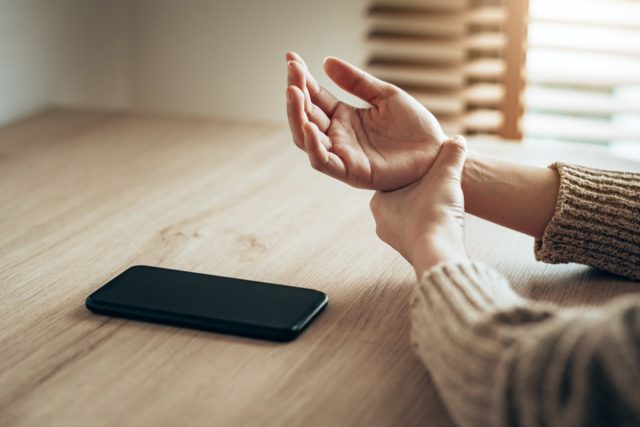While we try to watch what we eat, stay active and live an overall healthy life, we all have bad habits. It's impossible to not to, but there's some unhealthy behaviors that practically everyone has done and Dr. Jacob Hascalovici MD, PhD, Clearing Chief Medical Office explains what they are and why it's important to stop them now.
You Let Unimportant Things Take Up Your Time

Dr. Hascalovici says, "We all need to unwind, and experts tell us that deliberate relaxation and constructive daydreaming are actually good for our mood and creativity. If you lapse into the 'easy' kind of relaxation that involves hours of web surfing, phone fiddling, app scrolling, shopping or gaming, you may lose track of time and miss out on truly being present and deliberate in your life, however. Many of us do it–we're tired or don't know what else to do with our free time–but if you don't take mindful control of your time, you can lose evening after evening to the ether, so to speak. Bring in some mindfulness techniques to rein in that kind of distraction, and schedule some intentional activities that will involve your whole mind and body, which can lead to a deeper state of flow, engagement, and fulfillment. If you're still having trouble, it may help to remind yourself that a heart can beat around 4,200 times per hour. How many times do you want to spend those beats on another hour of online surfing?"
You Don't Take a Break Every 45-90 Minutes

"Once you're hard at work at your desk (or immersed in TV or the internet), it can be tough to remind yourself that you've been sitting still for a long time," says Dr. Hascalovici. "Good posture is important, but it's also very important to reset your posture by simply moving. Regular breaks can help your muscles and flexibility, improve your circulation, and can help you concentrate better. Rather than hampering your productivity, regular breaks, which can be simply standing up and stretching or taking a short, brisk walk, can also stave off the health risks of being sedentary for too long. Set an alarm for every 90 minutes to remind you to get up, and you'll be off to a great start."
You Cut Into Your Sleep Time

Dr. Hascalovici states, "Sleep can seem like the least glamorous thing sometimes. Well tell ourselves just ten more minutes of work, one more chapter of a book, or one more TV episode… and there goes another hour. Sleep can get clipped in the morning, too, when we have early meetings, find ourselves rushing, or try to cram workouts in before the rest of the day. None of that is bad on its own, per se, but if you're not getting enough sleep (seven to eight hours for most of us), you're going to have a much higher chance of gaining weight, having trouble concentrating, getting depressed, and more. If you chronically cut your sleeping time short, you could get sick more often and could suffer long-term consequences like heart attacks. Instead, defend your sleep. It's what helps keep you healthy, productive, and feeling in a stable mood, so it's vital. Keep to a regular sleep time in a cool, dark bedroom, and give yourself plenty of time before bed to brush your teeth, wash your face, moisturize, meditate, or do any other healthy wind-down routines."
Not Listening to Others

Dr. Hascalovici explains, "This one may not show up on very many lists, but it's common. Many of us simply don't slow down enough to listen to those around us. Instead, we're thinking about what we'll say when it's our turn to talk, are interrupting, are launching into monologues, or are multi-tasking and not really 'in' the conversation. You're probably not doing this on purpose. Rather, you could be following conversational patterns you learned, may talk more when you feel nervous, or feel that it's important to be the dominant talker. Some of those talking habits can isolate others, however, and don't give you the best opportunity to learn, connect, collaborate, and help the other person feel heard. To have better, more vibrant and effective conversations, practice the principles of reflective listening. Really focus on what your conversational partner is saying, paraphrase it, and ask questions that deepen the conversation rather than trying to switch the focus back to you right away."
Eating While Distracted

Dr. Hascalovici says, "We're so often eating while distracted or in a hurry. It's so easy to turn on a show or get your phone out for amusement while eating. Eating without paying attention to your plate does several things though, none of them all that great: 1) It takes away your chance to really enjoy your food, which means you may not enjoy your day as much and may not get to lift your mood with wise eating choices. 2) It means you're running a higher risk of eating more without realizing it. Many of us, even with moderate exercise, gain about a pound a year, which doesn't sound like much until several years go by. 3) It makes it more likely you'll choose quick, easy-to-eat foods, which are likely more highly processed, saltier, fattier, and just not as ideal as the occasional, balanced meal. When you eat well, you ingest a lot of valuable vitamins and minerals, meaning you'll also be healthier and happier. (If you struggle with pain and choose to eat a low inflammation diet, you'll also likely lower your pain, too.) The takeaway is that if we slowed down, chewed well, and paid attention to our food properly, we would enjoy it more and might also eat less, meaning we would gain less weight, have better cardiovascular health, and a lower chance of diabetes, among other things. We might also feel happier by learning to truly enjoy our food!"
Letting Things Pile Up

"Again, we all do this from time to time," Dr. Hascalovici emphasizes. "We toss mail into a pile, throw clothes on a chair, let our 'to do' list get really long, and just generally fail to take care of the little things. If we took a few moments to attend to pesky tasks and put things away before bedtime, we would feel more composed and able to concentrate. (Clutter, researchers have found, can disrupt our concentration and make us feel more distracted and less able to stay on task, while letting things like unanswered messages or bills go for too long can add up to more effort and stress than if we had just taken care of them in the first place.) Sometimes we let emotions pile up too, holding in anger, resentment, bitterness or other negative emotions that can heighten our stress and hike our chances of getting a heart attack. Instead, we can figure out healthier ways of "putting our emotions away," such as improved communication, boundary setting, and mindfulness."
No comments:
Post a Comment